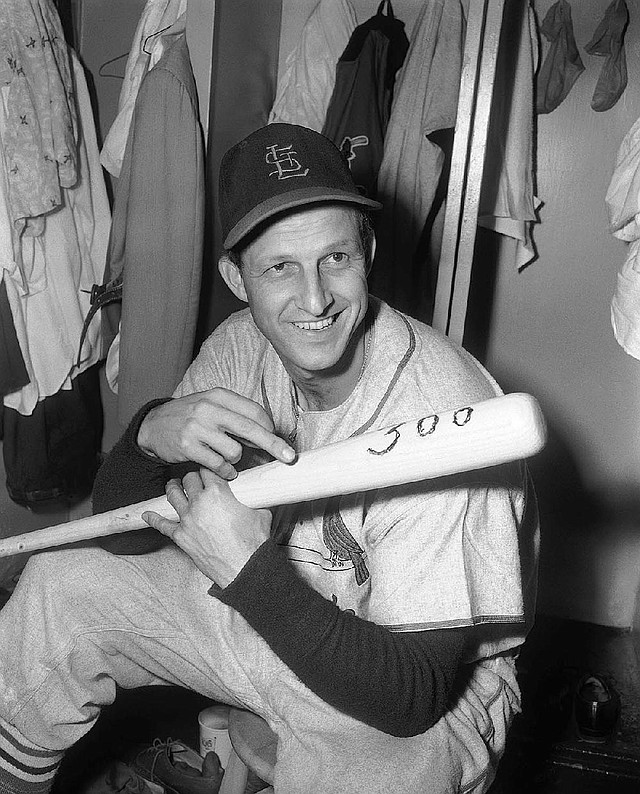Greatest Cardinal Musial dies at 92
Stan Musial, who spent his entire 22-year career with the St. Louis Cardinals, was a 24-time All-Star who won seven batting titles and was a three-time MVP.
Sunday, January 20, 2013
ST. LOUIS — Stan Musial, the St. Louis Cardinals star with the corkscrew stance and too many batting records to fit on his Hall of Fame plaque, died Saturday. He was 92.
Stan the Man was so revered in St. Louis that two statues in his honor stand outside Busch Stadium — one just wouldn’t do him justice. He was one of baseball’s greatest hitters, every bit the equal of Ted Williams and Joe DiMaggio even without the bright lights of the big city.
Musial won seven National League batting titles, was a three-time MVP and helped the Cardinals capture three World Series championships in the 1940s.
The Cardinals announced Musial’s death in a news release. They said he died Saturday evening at his home in Ladue, a St. Louis suburb, surrounded by his family. The team said Musial’s son-in-law, Dave Edmonds, informed the club of Musial’s death.
“I never heard anybody say a bad word about him, ever,” Willie Mays said in a statement released by the Hall of Fame.
Musial spent his entire 22-year career with the Cardinals and made the All-Star team 24 times — baseball held two All-Star games each summer for a few seasons. He was the longest-tenured living Hall of Famer.
“Stan will be remembered in baseball annals as one of the pillars of our game,” Hall of Fame President Jeff Idelson said. “The mold broke with Stan. There will never be another like him.”
A pitcher in the low minors until he injured his arm, Musial turned to playing the outfield and first base. It was a stroke of luck for him, as he went on to hit .331 with 475 home runs before retiring in 1963.
Widely considered the greatest Cardinals player ever, the outfielder and first baseman was the first person in team history to have his number retired. Ol’ 6 probably was the most popular, too, especially after Albert Pujols skipped town.
“I will cherish my friendship with Stan for as long as I live,” Pujols wrote on Twitter. “Rest in Peace.”
At the suggestion of a pal, actor John Wayne, Musial carried around autographed cards of himself to give away. He enjoyed doing magic tricks for kids and was fond of pulling out a harmonica to entertain crowds with a favorite, “The Wabash Cannonball.”
Humble, scandal-free, and eager to play every day, Musial struck a chord with fans throughout the Midwest and beyond. For much of his career, St. Louis was the most western outpost in the majors, and the Cardinals’ vast radio network spread word about him in all directions.
“We have lost the most beloved member of the Cardinals family,” team chairman William DeWitt Jr. said.
Musial’s public appearances dwindled in recent years, though he took part in the pregame festivities at Busch during the 2011 postseason as the Cardinals won the World Series. And he was at the White House in February 2011 when President Barack Obama presented him with the Presidential Medal of Freedom, America’s highest civilian honor for contributions to society.
At the ceremony, President Obama said: “Stan remains to this day an icon untarnished, a beloved pillar of the community, a gentleman you’d want your kids to emulate.”
In all, Musial held 55 records when he retired in 1963. Fittingly, the accolades on his bronze Hall plaque start off with this fact, rather than flowery prose: “Holds many National League records ...”
He played nearly until his 43rd birthday, adding to his totals. He got a hit with his final swing, sending an RBI single past Cincinnati’s rookie second baseman — that was Pete Rose, who would break Musial’s league hit record of 3,630 some 18 years later.
Of those hits, Musial got exactly 1,815 at home and exactly 1,815 on the road. He also finished with 1,951 RBI and scored 1,949 runs. Musial was the NL MVP in 1943, 1946 and 1948, and was runner-up four other years. He enjoyed a career remarkably free of slumps, controversies or rivalries.
“Stan was a favorite in Cooperstown, from his harmonica rendition of ‘Take Me Out to the Ball Game’ during Hall of Fame Induction ceremonies, to the reverence he commanded among other Hall of Fame members and all fans of the game. More than just a baseball hero, Stan was an American icon and we will very much miss him in Cooperstown,” said Hall of Fame chairman Jane Forbes Clark.
After retiring as a player, Musial served for years in the Cardinals’ front office, including as general manager in 1967, when the Cardinals won the World Series.
He was elected to the Hall of Fame in 1969, his first year of eligibility.
“It was, you know, a dream come true,” Musial once said. “I always wanted to be a ballplayer.”
Musial’s career feats
Numbers in parentheses denote where Stan Musial ranks all-time: 3 MVP awards 7 Batting titles won 24 All-Star Game appearances 177 Triples (19th) .331 Batting average (30th) .417 On base percentage (22nd) 475 Home runs (28th) .559 Slugging percentage (19th) 725 Doubles (3rd) 1,951 RBI, (6th) 1,959 Runs (9th) 1,599 Walks (13th) 3,630 Hits (4th) 6,134 Total bases (2nd)
Sports, Pages 23 on 01/20/2013
